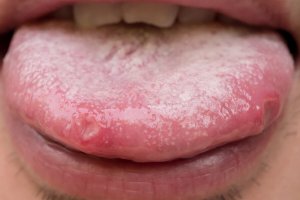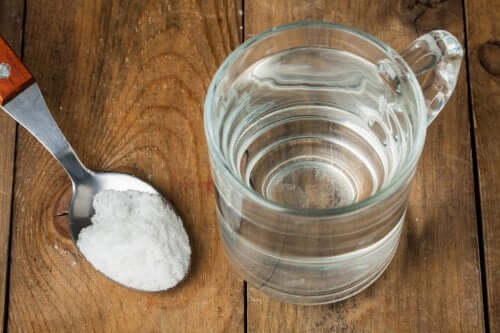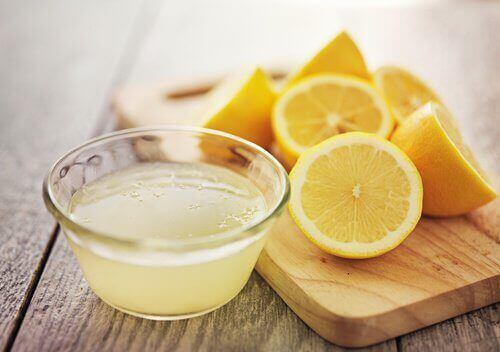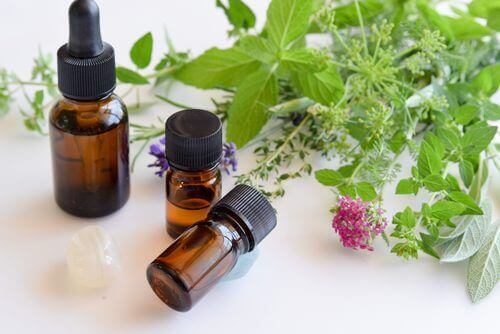Remedies for Oral Candidiasis: Natural Alternatives

Believe it or not, you can make many different remedies for oral candidiasis with natural ingredients. While it’s necessary to undergo medical treatment in many cases, mild forms of the condition can be minimized with homemade preparations.
This type of yeast infection usually appears due to an overgrowth of the fungus Candida albicans. This organism lives in the mouth in small amounts without causing damage. However, when it proliferates uncontrollably, it often triggers problems. Its symptoms include creamy white bumps in areas such as the tongue and inner cheeks. Also, it can also cause difficulty swallowing and a bad taste in the mouth.
Below, discover some natural options to fight it.
Five remedies for oral candidiasis you must try
Oral candidiasis is an infection that’s caused by an accumulation of the fungus Candida albicans in the lining of the mouth. Although it can develop at any age, it most often affects children and the elderly. Fortunately, you can fight this condition naturally.
While these solutions don’t replace the antifungal medications that doctors advise to eliminate yeast, they’re a good complement to relieve the symptoms of the infection. In addition, they may be the only remedies in milder cases. Try them out!
You should also read: Natural Solutions To Relieve The Symptoms of Candidiasis
1. Baking soda for oral candidiasis

First, a baking soda rinse is one of the best remedies for oral candidiasis. This solution has disinfectant and antifungal properties that help neutralize the action of the Candida albicans fungus.
How to use it
- First, dissolve half a teaspoon of baking soda in a cup of warm water.
- Then, gargle with the liquid for two minutes.
- Rinse and repeat twice a day until you see an improvement.
2. Plain yogurt
One of the best remedies for oral candidiasis is nothing more and nothing less than plain yogurt with probiotics. This culture of “good bacteria” may help control the growth of Candida. Also, it helps restore the balance of healthy bacteria in the mouth.
How to use it
- At the first sign of oral candidiasis, eat two servings of plain yogurt a day.
- Just make sure it’s sugar-free because this substance “feeds” the yeast.
3. Lemon juice

Lemon juice has many medicinal properties. Among them, we should mention that its components have antiseptic and antifungal effects. Therefore, it’s a good ally to fight oral candidiasis and its symptoms.
How to use it
- You have two choices. First, you can combine lemon juice and warm water and gargle this solution three times a day.
- Also, you can make tea with the juice and drink it, preferably on an empty stomach.
4. Turmeric for oral candidiasis
Turmeric never ceases to amaze us due to its natural applications. In this case, we highlight it as a solution to accelerate the recovery from oral candidiasis. According to studies, curcumin has an antifungal effect to fight several times of candida.
How to use it
- First, heat a cup of water.
- When it reaches its boiling point, add half a teaspoon of turmeric.
- If you want, you can add a pinch of black pepper.
- Take sips of the remedy twice a day until you see an improvement.
Make sure you read: Candidiasis: What Is It?
5. Oregano essential oil

Oregano oil is a product with antimicrobial and antifungal components. Many people have exploited these qualities in alternative treatments. In this regard, it’s one of the remedies for oral candidiasis that may minimize your symptoms.
How to use it
- Pour two drops of oregano oil in a glass of warm water. Make sure it’s an oil that’s designed for consumption.
- Then, gargle with the solution for two minutes.
- Spit out the solution and repeat twice a day.
Caution: You should never ingest essential oils. Also, the ideal thing is to dilute them in water because they can be aggressive. Follow the instructions.
When should you go to the doctor for oral candidiasis?
Most cases of oral candidiasis aren’t serious. In fact, they often disappear without treatment. However, if you have a weakened immune system, it’s best to consult your doctor. An untreated infection tends to spread more easily in patients with weakened immune systems.
If your symptoms don’t improve within a few days, it’s important to get a professional diagnosis. Other conditions can manifest with symptoms similar to those of oral candidiasis. Therefore, a different treatment may be necessary.
Some natural remedies are unsuitable for babies, children, or pregnant women. Thus, it’s essential to ask your doctor before you try them out. You also can’t ignore the fact that they can also interact poorly with certain drugs.
Are you experiencing the typical symptoms of oral candidiasis? If so, try some of the remedies we shared in this article. However, don’t forget to get your doctor’s advice to ensure good results.
All cited sources were thoroughly reviewed by our team to ensure their quality, reliability, currency, and validity. The bibliography of this article was considered reliable and of academic or scientific accuracy.
- Cheraghipour, K., Ezatpour, B., Masoori, L., Marzban, A., Sepahvand, A., Rouzbahani, A., Moridnia, A., Khanizadeh, S., & Mahmoudvand, H. (2021). Anti-Candida Activity of Curcumin: A Systematic Review. Current drug discovery technologies, 18(3), 379–390. https://pubmed.ncbi.nlm.nih.gov/32418527/
- Choonharuangdej, S., Srithavaj, T., & Thummawanit, S. (2021). Fungicidal and inhibitory efficacy of cinnamon and lemongrass essential oils on Candida albicans biofilm established on acrylic resin: An in vitro study.The Journal of Prosthetic Dentistry, 125(4), 707-e1.. https://www.thejpd.org/article/S0022-3913(20)30807-6/abstract
- Cleff, M., Meinerz, A., Xavier, M., Schuch, L., Meireles, M., Rodrigues, M., & Mello, J. (2010). In vitro activity of Origanum vulgare essential oil against Candida species. Brazilian journal of microbiology, 41, 116-123. https://www.ncbi.nlm.nih.gov/pmc/articles/PMC3768597/
- Cleveland Clinic. (14 de mayor del 2024). How To Get Rid of Thrush: 8 Remedies. Cleveland Clinic. Consultado el 14 de julio del 2024 https://health.clevelandclinic.org/thrush-the-white-stuff-growing-in-your-mouth-and-how-to-get-rid-of-it
- Didehdar, M., Chegini, Z., & Shariati, A. (2022). Eugenol: A novel therapeutic agent for the inhibition of Candida species infection. Frontiers in Pharmacology, 13. https://www.frontiersin.org/journals/pharmacology/articles/10.3389/fphar.2022.872127/full
- Faot, F., Cavalcanti, Y. W., Mendonça e Bertolini, M.d, Pinto, L.deR., da Silva, W. J., & Cury, A. A. (2014). Efficacy of citric acid denture cleanser on the Candida albicans biofilm formed on poly(methyl methacrylate): effects on residual biofilm and recolonization process. BMC oral health, 14, 77. https://www.ncbi.nlm.nih.gov/pmc/articles/PMC4076759/
- Huynh, N., Everts, V., Leethanakul, C., Pavasant, P., & Ampornaramveth, R. (2016). Rinsing with Saline Promotes Human Gingival Fibroblast Wound Healing In Vitro. PloS One, 11(7), e0159843. https://journals.plos.org/plosone/article?id=10.1371/journal.pone.0159843
- Jayachandran, S., & Madeswaran, S. (2018). Sodium bicarbonate: A review and its uses in dentistry. Indian Journal Of Dental Research/Indian Journal Of Dental Research, 29(5), 672. https://journals.lww.com/ijdr/fulltext/2018/29050/sodium_bicarbonate__a_review_and_its_uses_in.25.aspx
- Karpiński, T. M., Ożarowski, M., Seremak-Mrozikiewicz, A., & Wolski, H. (2023). Anti-Candida and Antibiofilm Activity of Selected Lamiaceae Essential Oils. Frontiers In Bioscience, 28(2), 28. https://www.imrpress.com/journal/FBL/28/2/10.31083/j.fbl2802028
- Mota, A., De Castro, R., De Araújo Oliveira, J., & De Oliveira Lima, E. (2014). Antifungal Activity of Apple Cider Vinegar on Candida Species Involved in Denture Stomatitis. Journal Of Prosthodontics, 24(4), 296-302. https://onlinelibrary.wiley.com/doi/abs/10.1111/jopr.12207
- Radithia, D., Tanjungsari, R., Ernawati, D., & Parmadiati, A. (2023). The effectiveness of essential oil from Citrus limon peel on Candida albicans biofilm formation: An experimental in vivo study. Journal of Taibah University Medical Sciences, 18(1), 190-195. https://www.sciencedirect.com/science/article/pii/S1658361222001500?via%3Dihub
- Yang, Y., Zhang, F., Lyu, X., Yan, Z., Hua, H., & Peng, X. (2017). Prevention of Oral Candidiasis After Free Flap Surgery: Role of 3% Sodium Bicarbonate Saline in Oral Care. Journal Of Oral And Maxillofacial Surgery, 75(3), 641-647. https://www.joms.org/article/S0278-2391(16)30771-6/abstract
- Zeise, K. D., Woods, R. J., & Huffnagle, G. B. (2021). Interplay between Candida albicans and Lactic Acid Bacteria in the Gastrointestinal Tract: Impact on Colonization Resistance, Microbial Carriage, Opportunistic Infection, and Host Immunity. Clinical Microbiology Reviews, 34(4). https://journals.asm.org/doi/10.1128/cmr.00323-20
This text is provided for informational purposes only and does not replace consultation with a professional. If in doubt, consult your specialist.








